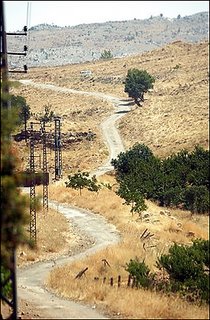Lebanon Border Troops Focus on Smugglers

Lebanon Border Troops Focus on Smugglers
By STEVEN R. HURST
The Associated Press
Saturday, August 26, 2006; 1:48 PM
AITA AL-FOUKHAR, Lebanon -- A mile from the Syrian border, a Lebanese armored personnel carrier sat behind freshly dug berms of red earth Saturday and a second sheltered under camouflage netting. Soldiers in new uniforms checked vehicles traveling the mountain road.
The curving track _ climbing past vineyards, heavy laden in late August, and newly harvested peach orchards _ was cratered in two places by Israeli missiles fired in the first days of the monthlong war with Hezbollah.
Gravel in some places, crumbling asphalt in others, the road traces the contours of the rugged Anti-Lebanon range and long served as a major route for gunrunners bringing arms for the militant Shiite guerrillas of Hezbollah.
A dirt road which leads towards the Syrian border is seen from Aita-Al-Fourkhar village in the Bekaa Valley, Lebanon, Saturday, Aug. 26, 2006. The Lebanese army is rushing troops to the country's porous borders, because Israel has said it won't lift its air and sea blockade of the country until the frontier is clamped shut and new arms are not flowing to Hezbollah fighters from their benefactors in Syria and Iran. The army said putting soldiers along the route has reduced smuggling by 90%. (AP Photo/Kevork Djansezian)
Photo Credit: AP Photo
"Since we got here two weeks ago we believe we've stopped 90 percent of the smuggling from Syria," boasted a Lebanese army captain, who would not give his name because he was under orders not to speak to journalists.
The army is rushing troops to Lebanon's porous borders because Israel says it won't lift its air and sea blockade of the country until the frontier is clamped shut and arms stop flowing to Hezbollah fighters from their benefactors in Syria and Iran.
Israeli Prime Minister Ehud Olmert has even demanded that the expanding U.N. peacekeeping force for southern Lebanon put its soldiers along the mountainous frontier with Syria to patrol the four official crossings and 60 illegal ones, like the one near Aita al-Foukhar.
Syrian President Bashar Assad, whose government was forced by international pressure last year to pull its army out of Lebanon after a three-decade occupation, has warned that the presence of outside troops on the border would be considered "hostile."
Lebanese Prime Minister Fuad Saniora has sought to finesse the issue by insisting that his troops are up to the task of policing the border while not rejecting the Israeli demand outright.
"We have no intention of showing any hostility toward Syria," Saniora said late in the week. "We want cordial relations with Syria and we are taking care of the issue of the border to prevent any infiltration into Lebanon."
Saniora has pleaded with Washington to pressure Israel to lift the blockade, and his office issued a statement Saturday saying that Secretary of State Condoleezza Rice telephoned to say she would do her best and that she agreed Lebanese forces should monitor the border.
French President Jacques Chirac, who has pledged 2,000 soldiers to a U.N. force planned to number 15,000, said the U.N. mandate does not call for guarding the Syrian border. U.N. Secretary-General Kofi Annan said the troops would take up positions there only if invited by Saniora's government.
For now, Lebanon is putting its troops at key positions near illegal crossing points. U.N. envoy Terje Roed-Larsen has said 2,000 Lebanese soldiers have been deployed along Lebanon's eastern border with Syria, with the goal of eventually having 8,600 there.
At the Masnaa crossing in the Bekaa Valley, the main border point on the highway from Beirut to Damascus, extra soldiers were on duty and long lines of trucks backed up in each direction awaiting customs clearance.
Lebanese border police and customs officials hotly denied they allowed weapons from Syria to cross the border and showed a visiting reporter the careful searches they were conducting. But Lebanese living near the border said the right amount of money in the right hands could win entry for trucks with questionable cargo.
Two dirt tracks leading into the hills flanking the highway through no man's land between the Lebanese and Syrian sides of the Masnaa crossing were unobstructed.
A border policeman, however, said army posts had been set up a few hundred yards off the road to block smugglers from detouring around the official crossing. He would not give his name, saying he was under orders not to speak to reporters.
One smuggling route passes through Aita al-Foukhar, a mainly Christian village with two Greek Catholic churches and one mosque. At the east end of town, two missile craters were filled in and cars passed slowly over the rough patch. A blue Volkswagen beetle sat with its roof ripped back like the lid on a tuna can.
Relatives said 15-year-old Michel Samaan was driving the car when an Israeli missile tore into it. He was killed instantly, they said. His father and 11-year-old brother survived but were badly wounded. To look at the car it was hard to imagine anyone escaped.
Henri Mouaikel, a 25-year-old cousin of the dead youth, stood nearby. He had just driven from Beirut and was recording video of the wreckage.
He said his cousin was killed at 3 p.m. on July 18, the seventh day of the war, as Israeli jets bombed and rocketed roads like the one that snakes through Aita al-Foukhar to the Syrian frontier.
"I just can't believe an old blue Volkswagen was mistaken for a gunrunner," he said. "I hope he was just in the wrong place at the wrong time, that it was a mistake."
Youngsters at a nearby house handed out juicy green grapes to visitors. Mouaikel shook his head, got into his green Toyota and headed back the 42 miles to the capital.